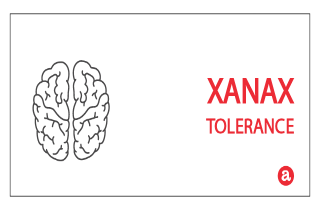Does Xanax (alprazolam) not work quite as well for you anymore?
Are you concerned that you might be developing a tolerance to or physical dependence on Xanax? Maybe worried your tolerance will become an Xanax addiction? In this article, we’ll explore Xanax tolerance, as well as its relationship to Xanax dependence and addiction. We’ll also talk about what you can do about your tolerance to Xanax. Your questions about tolerance to Xanax are welcomed at the end.
Developing tolerance to Xanax
Although tolerance to Xanax does not affect how fast Xanax works or how long Xanax effects last, it affects HOW MUCH Xanax you need to take. When you are tolerant to alprazolam, you need higher and higher doses to achieve similar therapeutic effect. So when does higher Xanax tolerance occur?
1. After taking either the brand name Xanax or generic alprazolam for extended periods of time or in high doses, it’s common to develop a tolerance to Xanax.
2. You’ll develop a tolerance more quickly if you aren’t taking Xanax as directed by your doctor – for example, in larger than normal amounts.
Tolerance to Xanax usually accompanies a physical dependence on Xanax, making it difficult to quit taking Xanax without careful planning. However, unless you’re experiencing strong cravings or psychological symptoms which compel you to take Xanax, you likely HAVE NOT developed an addiction.
Xanax tolerance symptoms
Xanax tolerance has two main symptoms:
1. Xanax (alprazolam) slowly stops working to control anxiety symptoms.
2. You need to keep taking higher doses of Xanax to get the same effect of initial relief as when you started taking Xanax.
It’s important not to jump to conclusions and assume you have a Xanax addiction just because you’re developing a tolerance to the medication. In fact, Xanax tolerance is a medical outcome that doctor anticipate after long term use of the drug as your body gets used to the Xanax in your system and doesn’t respond to alprazolam as well as it used to.
Xanax tolerance: How long?
It doesn’t take very long to develop a tolerance to Xanax. You can become resistant to the effects of the drug alprazolam in a month or less. You can also develop a physical dependence on Xanax just as quickly. This is especially true if you start out at a higher dose of Xanax.
High tolerance to Xanax
Most people start off with very low doses of Xanax, only .25 – .5 mg, and this is gradually increased until it becomes effective in the treatment of anxiety. Over time, the dose may be increased as a tolerance develops. Some patients may need to take 10 mg per day or more to get any effects from Xanax.
How to lower tolerance to Xanax
The only way to lower your tolerance to Xanax is to lower your dose. Unfortunately, you won’t be getting the desired effect from Xanax when you do this, which can be unpleasant for people suffering from anxiety disorders. It can also take a long time for Xanax tolerance to go back down – especially if you’ve taken it for a long time. If you’re suffering from anxiety and Xanax no longer helps, it may be worth talking to your doctor about alternative treatments which might work better long-term.
Lowering your tolerance by cutting back doses may also leave you feeling some withdrawal effects. But, if you are interested in getting off of the medication for good, it may help to be prepared for what’s coming. Xanax Withdrawal Treatment can actually help you quit the drug and increases your chances of staying quit long term.
Building up tolerance to Xanax questions
Do you still have questions about Xanax tolerance? Please share your questions and experiences with Xanax in the comments below.









Related Posts